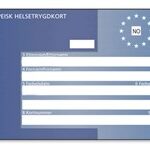When you inherit a property in another country, you need to fulfil the formalities of the country where the property is located, as in Spain.
This rule applies even though the deceased and the inheritors where Norwegian. No matter if there is a will where the deceased decided that he chose the Norwegian law to declare who his inheritors will be. One thing is who is entitled to receive his assets; this will be decided by the law of his election and, a different thing is the formalities of transfer of the property from the deceased to the inheritor. This latest will be carried out according to the Spanish law.
This general principle of law is quite common in most countries. The formalities of any transmission of property will follow the rules and you pay the taxes in the country where the property is located.
The formalities in Spain are not short and easy but, they guarantee the security of the process. Problems arise when the inheritance is not safeguarded by the proper and experienced professional in inheritance-law.
There are quite a few documents from different authorities in Spain that the inheritors need to obtain to perform the inheritance settlement. Some of these documents are: the Certificate of last will and testament; this document proves whether a person has made a will in Spain and gives the deed number and the name of the notary before whom it was signed, the Last will and testament of the deceased, If there is a will, a certified copy must be obtained from the notary before whom it was signed. If there is no will, a declaration of legal heirs. Furthermore, the heir’s acceptance must appear in a document called Deed of official acceptance and distribution of the estate. This latest should be forwarded to the Tax authorities to obtain a certificate from the Tax authorities showing that inheritance tax has been paid or, in case the estate is exempt from this tax, this must be expressly reflected in an official certificate issued by the tax authorities responsible for collecting this tax.
Other formalities and authorities are also involved such as the Town-Hall where the value added tax (plusvalia) should be paid; the bank where the deceased had a bank account or; the property-register which is the competent authority to certify, officially, who is the owner of a property in Spain.
The lawyer will be the “project-leader” of the team. It is most advisable to give a power of attorney to a lawyer you trust so that she can act on your behalf while you can relax in your home country.
All these steps and professionals involved should be coordinated as they are linked together in the sense that it is not possible to get a certificate if you do not have the previous one. The inheritance-settlement will be managed by the lawyer under her responsibility. In this way the process could take a bit longer but will be smooth for the inheritor. The inheritor will only have to wait until the settlement is completed and the property is registered into his name.





Recent Comments